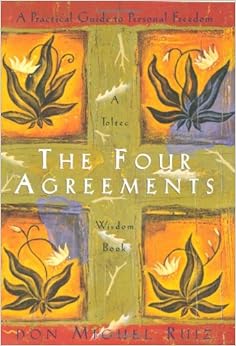Perhaps not directly relevant to the subject matter, however the title "The Four Agreements" reminded me of the classical Epicurean model of true friendship and personal boundaries, based on mutual "neither harm nor be harmed".
Allow me to illustrate this with an example. Bob and Sue are true friends.
Four Agreements:
- Bob goes out of his way to avoid hurting or harming Sue (respects Sue's personal boundaries).
- Bob goes out of his way to avoid being hurt or harmed by Sue (asserts his own personal boundaries).
- Sue goes out of his way to avoid hurting or harming Bob (respects Bob's personal boundaries).
- Sue goes out of his way to avoid being hurt or harmed by Sue (asserts her own personal boundaries).
Those are the "Four Agreements" which spring to mind when I hear the term. It's a quadruple agreement which is present in any true friendship, a solid bind to prevent anyone getting hurt, articulating the responsibilities to both self and other which constitute genuine friendship (in Greek, philia). Both justice and friendship take the same form - neither harm nor be harmed.
Assertiveness is very much implicit in the classical Epicurean model in my reading of it. That necessitates an avoidance of both passivity (e.g. fleeing), requiring the character strength of courage; and aggression (hurting/harming the other through fighting), requiring the character strength of self-control.
True friends are furthermore to encourage each other to achieve health, happiness and inner peace, while prioritising their own, creating a win-win arrangement. Here is where the boundary between self-interest and altruism breaks down, and there is no place for shame and guilt. Only the aspiration towards one's own genuine happiness and inner peace, rooted in a profound respect for one's own dignity (in my reading of it).
Epicurus went so far as to call true friendship an "immortal good", given how it has utility in transcending the fear of death (the most primal fear), and bringing the individual towards a sense of robust inner peace (in Greek: ataraxia) and relaxation of physical bodily muscular tension (in Greek: aponia).
Furthermore, development of the classical four cardinal strengths of character (or "virtues"), that is: prudence, self-control, courage, and justice (neither harm nor be harmed), are necessary for the practice of true friendship, for cultivating the requisite virtues required to be a good friend, as is taking responsibility for the consequences of one's own actions.
It is also expected that humans will mess up and fail from time to time - only a mythical "sage" is exempt. A "philosopher" is a "lover of wisdom", someone "homesick" for natural wisdom (in one reading) which has been buried under errors of thought and action picked up (such as via past traumas). This implies some form of humility - to aspire after wisdom implies a recognition that one is lacking it, that is, that one is often foolish. No shame or guilt is implied by this, merely a recognition that one is "missing the mark" (in Greek: harmartia), and would be best to change perspective (in Greek: metanoia). Wisdom itself, and its cultivation, is ultimately only something useful as means to the end of living a happy life for oneself (personal ethical egoism). It's all about you in the end, your own rational self-interest.
"Only the wise man, who prunes away all the rank growth of vanity and error, can possibly live untroubled by sorrow and by fear, content within the bounds that nature has set." (citation by Cicero).
Thus the Epicurean ethic offers both a robust model of true friendship between individuals (seeking their own happiness in life first and foremost), and of personal development, which I believe constitutes a radical common sense model for living a happy life. I offer this post here in the spirit of genuine friendship in this very model.
Mequa




